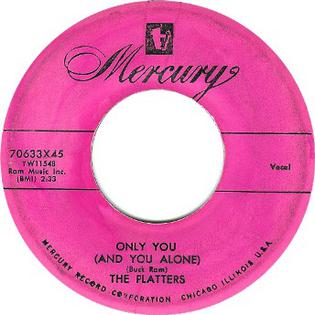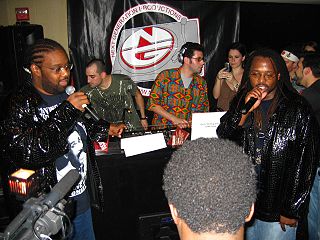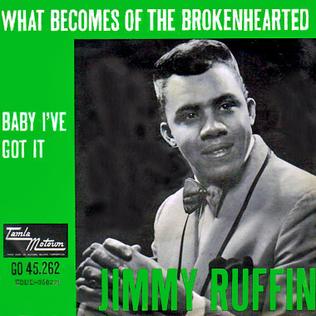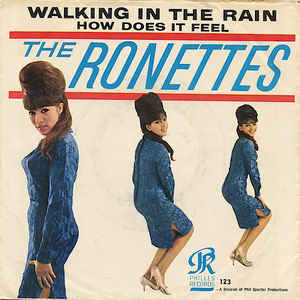Related Research Articles

The Dixie Cups are an American pop music girl group of the 1960s. They are best known for a string of hits including their 1964 million-selling record "Chapel of Love", "People Say", and "Iko Iko".

"Unchained Melody" is a 1955 song with music by Alex North and lyrics by Hy Zaret. North wrote the music as a theme for the prison film Unchained (1955), hence the song title. Todd Duncan sang the vocals for the film soundtrack. It has since become a standard and one of the most recorded songs of the 20th century, most notably by the Righteous Brothers in 1965. According to the song's publishing administrator, over 1,500 recordings of "Unchained Melody" have been made by more than 670 artists, in multiple languages.
Soft rock is a form of rock music that originated in the late 1960s in Southern California and the United Kingdom which smoothed over the edges of singer-songwriter and pop rock, relying on simple, melodic songs with big, lush productions. Soft rock was prevalent on the radio throughout the 1970s and eventually metamorphosed into a form of the synthesized music of adult contemporary in the 1980s.

"Only You " is a pop song composed by Buck Ram. It was originally recorded by The Platters with lead vocals by Tony Williams in 1955.

The Gap Band was an American R&B and funk band that rose to fame during the 1970s and 1980s. The band consisted of three brothers: Charlie, Ronnie, and Robert Wilson, along with other members; it was named after streets in the historic Greenwood neighborhood in the brothers' hometown of Tulsa, Oklahoma.
K-Ci & JoJo is an American R&B duo, consisting of brothers Cedric "K-Ci" Hailey and Joel "JoJo" Hailey. Natives of Monroe, North Carolina, they are also the lead singers of the chart-topping R&B group Jodeci with the DeGrate brothers—Donald and Mr. Dalvin.

"Ain't Nothing Like the Real Thing" is a 1968 single released by American R&B/soul duo Marvin Gaye and Tammi Terrell, on the Tamla label in 1968. The B-side of the single is "Little Ole Boy, Little Ole Girl" from the duo's United LP. The first release off the duo's second album: You're All I Need, the song - written and produced by regular Gaye/Terrell collaborators Ashford & Simpson - became a hit within weeks of release eventually peaking at number 8 on the Billboard Hot 100 and number 1 on the Hot Soul Singles chart, the first of the duo's two number 1 R&B hits. In the UK "Ain't Nothing Like the Real Thing" reached number 34.

P.M. Dawn was an American hip hop and R&B act that formed in 1988 by the brothers Attrell Cordes and Jarrett Cordes in Jersey City, New Jersey. They earned significant crossover success in the early 1990s with music that merged hip hop, older soul, and more pop-oriented urban R&B.
"Stop, Look, Listen " is a soul song written by Thom Bell and Linda Creed that was originally recorded by the Philadelphia soul group the Stylistics.

"What Becomes of the Brokenhearted" is a hit single recorded by Jimmy Ruffin and released on Motown Records' Soul label in the summer of 1966. It is a ballad, with lead singer Jimmy Ruffin recalling the pain that befalls the broken-hearted who had love that's now departed. The song essentially deals with the struggle to overcome sadness while seeking a new relationship after a breakup.

"Piece of My Heart" is a romantic soul love song written by Jerry Ragovoy and Bert Berns, originally recorded by Erma Franklin in 1967. Franklin's single peaked in December 1967 at number 10 on the Billboard Hot Rhythm & Blues Singles chart in the United States.
"Take Me to the River" is a 1974 song written by singer Al Green and guitarist Mabon "Teenie" Hodges. Hit versions were recorded by both Syl Johnson and Talking Heads. In 2004, Al Green's original version was ranked number 117 on Rolling Stone magazine's list of the Rolling Stone's 500 Greatest Songs of All Time.

The discography of American singer Robin Thicke consists of 8 studio albums, 30 singles and 23 music videos. Thicke signed his first recording contract with Interscope Records as a teenager and found success as a songwriter, before he began concentrating on his career as a performer. In 2000, Thicke started recording his debut album, A Beautiful World, which was released in April 2003. The album debuted at number 152 on the US Billboard 200, selling 119,000 copies. The record also peaked at number 36 on the Mega Album Top 100 in the Netherlands. Two singles were released from the album; the first, "When I Get You Alone" became a top ten hit in the Netherlands and New Zealand. That single also peaked at number 17 in Australia and was certified gold by the Australian Recording Industry Association (ARIA). In 2006, Thicke released his second studio album The Evolution of Robin Thicke. The record debuted at number 5 on the US Billboard 200, topped it on the Billboard's Top R&B/Hip-Hop Albums, and became a certified platinum by the Recording Industry Association of America (RIAA). The album also charted in France, the Netherlands, and the United Kingdom. The Evolution of Robin Thicke produced four singles, all of which charted on the Billboard's Hot R&B/Hip-Hop Songs. "Lost Without U" became one of his biggest hits, peaking at number 14 on the US Billboard Hot 100 and spending 11 weeks atop the Billboard's Hot R&B/Hip-Hop Songs.
"(She's) Some Kind of Wonderful" is a song written by Canadian-American musician John Ellison and first recorded by his R&B group, Soul Brothers Six, in 1967, peaking at number 91 on the U.S. Billboard Hot 100.

"Take Me in Your Arms " is a song written by the premier Motown songwriting/production team of the 1960s Holland–Dozier–Holland. The first hit recording was sung by Kim Weston in 1965. It was most popular in 1975 when it was recorded by the Doobie Brothers.

"I'll Be Good to You" is a 1976 hit song by R&B duo the Brothers Johnson. George Johnson, one of the two Johnson brothers in the band, wrote the song after deciding to commit to a relationship with one woman, instead of dating several at a time. While George was recording a demo for the song, family friend Senora Sam came by and added some lyrics. Brothers Johnson producer and mentor Quincy Jones heard the song, liked it, and convinced George to sing lead on the finished track. Released from their debut album, Look Out for #1, it was a top-ten hit on the Billboard Hot Singles Charts, peaking at number three, and a number one song on the Billboard R&B Charts during the summer of 1976. The single was later certified gold by the RIAA.

"Never My Love" is a pop standard written by American siblings Don and Dick Addrisi, and best known from a hit 1967 recording by the Association. The Addrisi Brothers had two Top 40 hits as recording artists, but their biggest success as songwriters was "Never My Love". Recorded by dozens of notable artists in the decades since, in 1999 the music publishing rights organization Broadcast Music, Inc. (BMI) announced it was the second most-played song on radio and television of the 20th century in the U.S.
Lloyd Parks is an American R&B/soul singer born in Philadelphia, Pennsylvania, United States. He is an original member of the Philadelphia International Records group, Harold Melvin & the Blue Notes. Lloyd is noted for his high tenor and falsetto vocal leads and harmonies. He is also a founding member of the Epsilons who backed Arthur Conley on his Atco Records hit single "Sweet Soul Music".

"Walking in the Rain" is a song written by Barry Mann, Phil Spector, and Cynthia Weil. It was originally recorded by the girl group the Ronettes in 1964 who had a charting hit with their version. Jay and the Americans released a charting hit cover of the song in 1969. The song has since been recorded by many other artists over the years, including the Walker Brothers.

"I" is a song by American rapper Kendrick Lamar featuring Ronald Isley of The Isley Brothers. It was released on September 23, 2014 as the lead single from Lamar's third studio album To Pimp a Butterfly. The song uses music from "That Lady", written by and originally performed by R&B group The Isley Brothers, elements from which were re-recorded rather than being directly sampled from the original record. "i" won two awards at the 2015 Grammy Awards: Best Rap Performance and Best Rap Song.
References
- ↑ Billboard, AllMusic
- ↑ Billboard Singles, AllMusic
- ↑ "Item Display – RPM – Library and Archives Canada". Collectionscanada.gc.ca. August 3, 1974. Retrieved February 26, 2022.